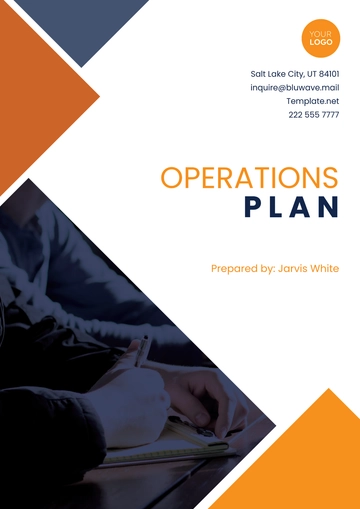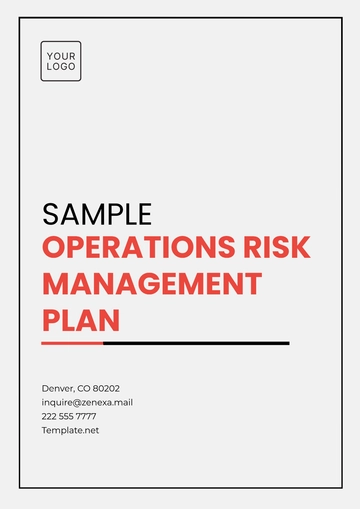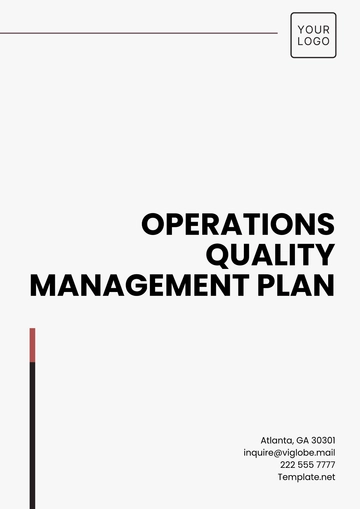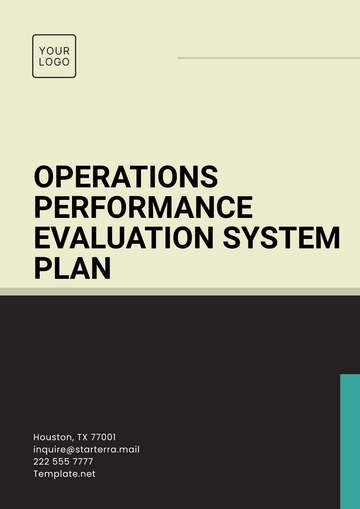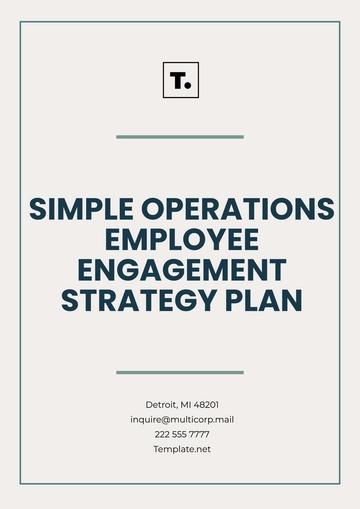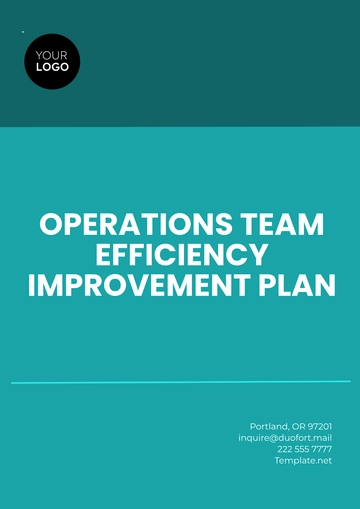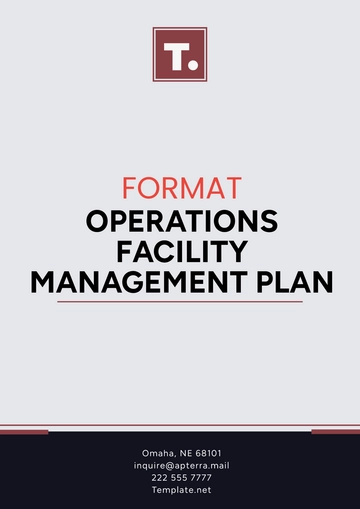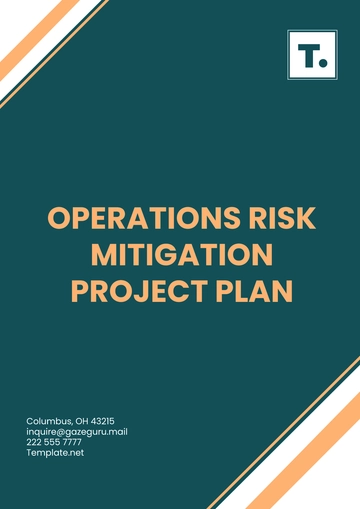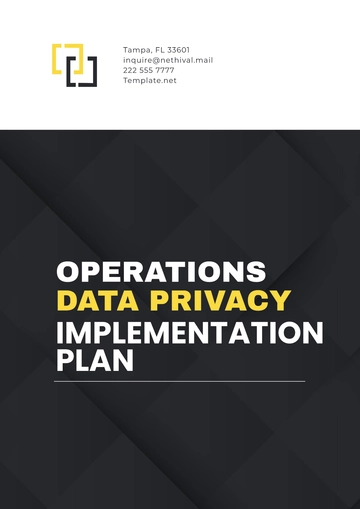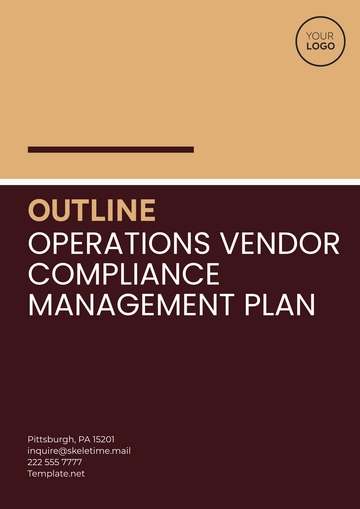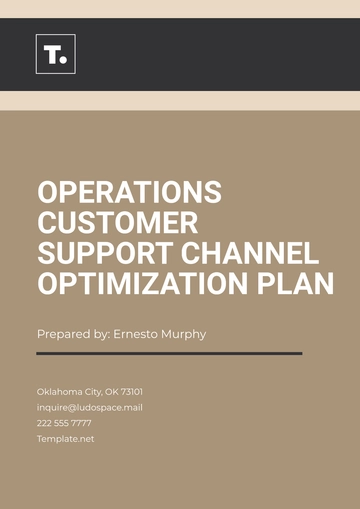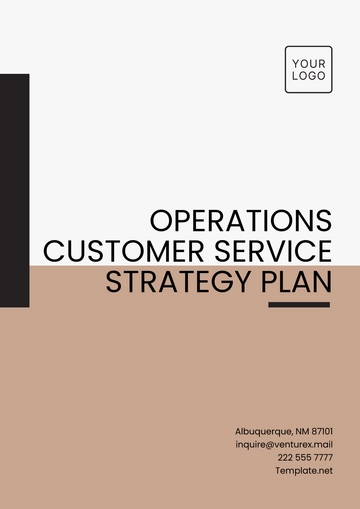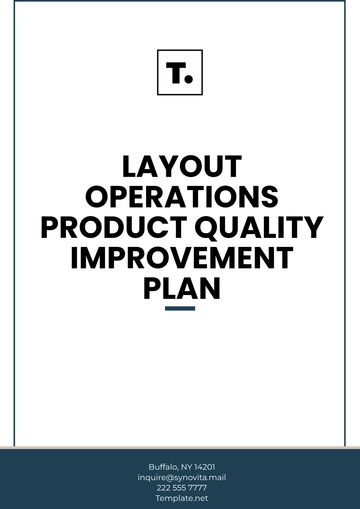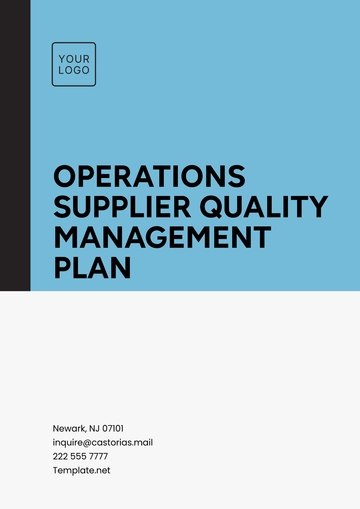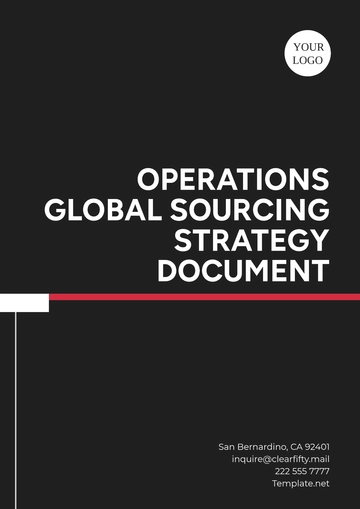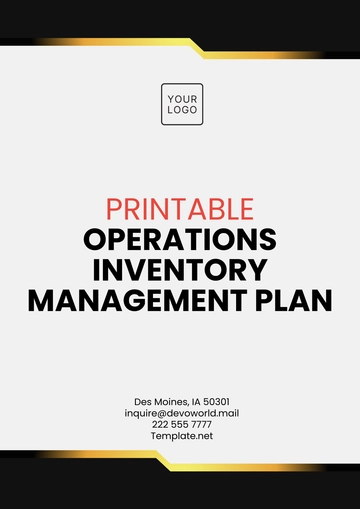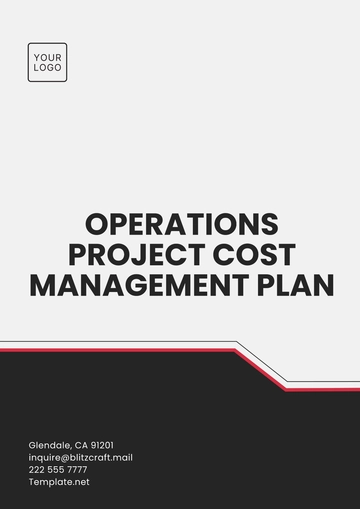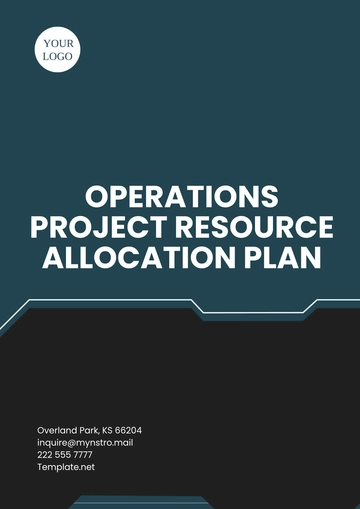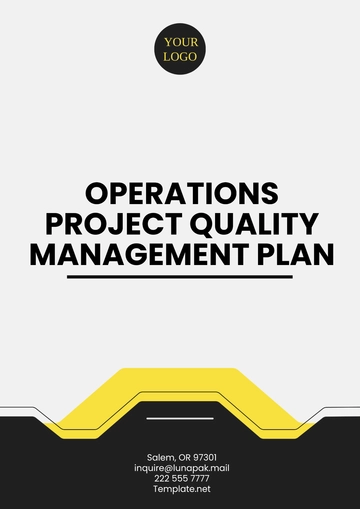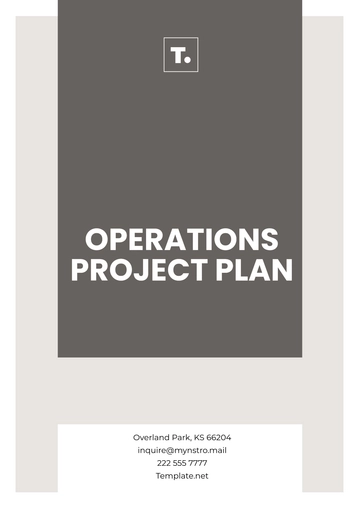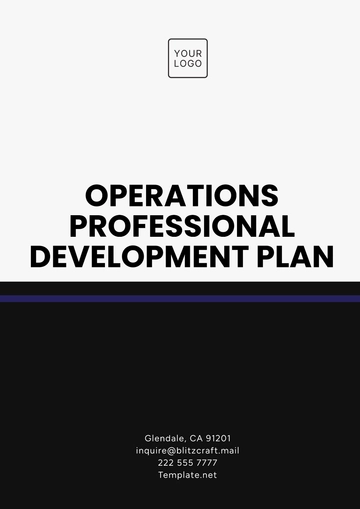Free Marketing Operations Plan
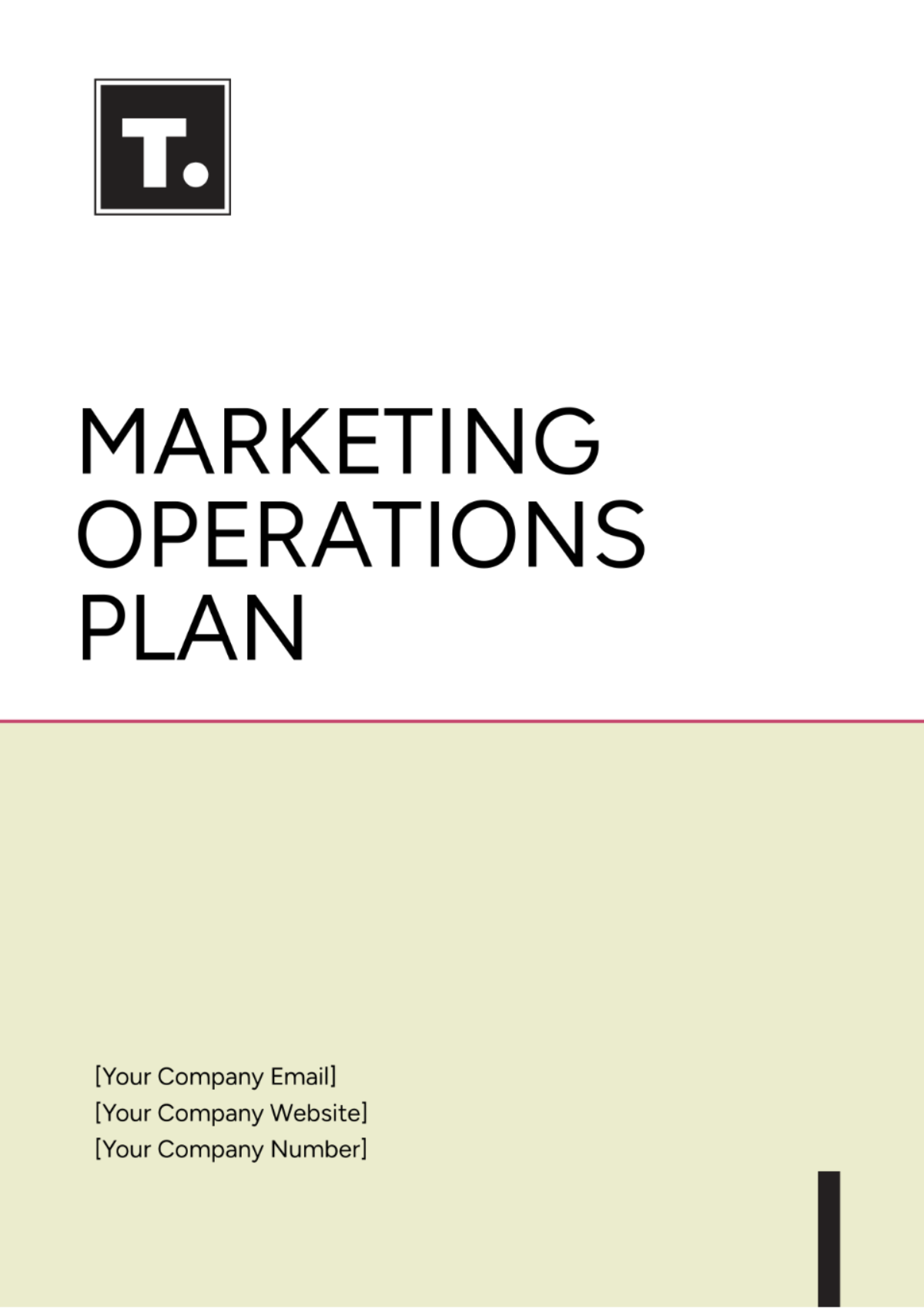
I. Executive Summary
In today's dynamic market, effective marketing is crucial for businesses to thrive. This comprehensive marketing plan outlines our strategies and tactics to achieve our objectives efficiently and drive sustainable growth. Recognizing the complexity of modern marketing, we emphasize the need to establish a dedicated marketing team or engage the services of a specialized agency. Clear delineation of roles and responsibilities within the team or agency is essential for seamless execution. Furthermore, we underscore the significance of leveraging automation tools and systems to streamline processes and enhance productivity in executing marketing activities.
II. Team Structure and Responsibilities
Our marketing team structure is designed to ensure optimal collaboration and efficiency in achieving our goals:
Marketing Director: This pivotal role oversees the overall marketing strategy, ensuring alignment with the company's objectives. The Marketing Director is responsible for setting clear objectives, coordinating team efforts, and fostering synergy among team members.
Content Creator: The Content Creator plays a vital role in developing compelling and relevant content across various marketing channels. From blog posts to social media updates and email newsletters, the Content Creator crafts engaging narratives to resonate with our target audience.
Campaign Manager: Responsible for planning, executing, and monitoring marketing campaigns across diverse channels, the Campaign Manager plays a critical role in driving brand awareness and customer engagement. Through meticulous campaign management and optimization, this role ensures maximum ROI on marketing investments.
Analytics Specialist: Data-driven decision-making is facilitated by the Analytics Specialist, who tracks and analyzes marketing performance metrics. By deriving actionable insights from data, this role informs strategic adjustments and optimizations to enhance marketing effectiveness.
Partnership Manager: Cultivating and nurturing relationships with external partners is the primary focus of the Partnership Manager. From influencers to affiliates and industry organizations, this role collaborates on co-marketing initiatives to expand our brand's reach and foster mutually beneficial partnerships.
III. Marketing Strategies and Tactics
Our marketing strategies encompass a diverse array of tactics aimed at engaging our target audience and driving conversions:
Content Marketing: Through a strategic content calendar, we deliver valuable and educational content to our audience. By leveraging SEO best practices, we enhance visibility and attract organic traffic to our digital assets.
Social Media Marketing: Engaging our audience on platforms like Facebook, Instagram, and LinkedIn, we foster community interaction and drive traffic to our website. Paid advertising on these platforms enables precise targeting and amplifies our brand's reach.
Email Marketing: Personalized email campaigns segmented based on audience preferences nurture leads and promote our products/services. Automated sequences, including welcome emails and abandoned cart reminders, enhance customer engagement and drive conversions.
SEO: Optimizing our website for relevant keywords enhances our search engine rankings, increasing organic traffic and visibility. Both on-page and off-page SEO strategies, including link-building and local SEO efforts, contribute to our online presence.
PPC Advertising: Targeted PPC campaigns on search engines and social media platforms drive qualified traffic to our website. Continuous monitoring and optimization of these campaigns ensure maximum ROI and conversion rates.
IV. Marketing Automation Tools and Systems
Our marketing operations are streamlined through the integration of automation tools and systems:
Email Marketing Automation: Platforms like Mailchimp and HubSpot enable the automation of email campaigns, including drip sequences and personalized communications, enhancing efficiency and effectiveness.
Social Media Management: Tools like Hootsuite and Buffer facilitate the scheduling and publishing of social media content across multiple platforms. Real-time monitoring and analytics enable informed decision-making and optimization.
CRM: Implementing a robust CRM system like Salesforce or Zoho CRM centralizes customer data and interactions. From lead management to targeted marketing campaigns, CRM enhances customer relationship management and drives revenue.
Analytics Tracking: Utilizing tools like Google Analytics or Adobe Analytics, we track and analyze website traffic, user behavior, and conversion metrics. Data-driven insights inform strategic decision-making and optimization efforts.
Campaign Optimization: A/B testing tools and software such as Optimizely enable us to experiment with different marketing messages and tactics. Continuous optimization based on data-driven insights maximizes the effectiveness of our campaigns.
V. Budget Allocation
Strategic allocation of financial resources ensures optimal utilization of our marketing budget:
Content Creation: Allocating 30% of our budget to content creation enables us to consistently deliver high-quality, engaging content across various channels.
Advertising: With 40% of our budget allocated to advertising, split between social media and PPC advertising, we maximize our brand's visibility and reach our target audience effectively.
Marketing Automation Tools: Allocating 15% of our budget to subscription fees for marketing automation tools ensures seamless workflow automation and enhances operational efficiency.
Analytics and Reporting: Investing 10% of our budget in analytics tools and reporting software enables us to track performance metrics accurately and derive actionable insights for optimization.
Miscellaneous: Reserving 5% of our budget for miscellaneous expenses ensures flexibility to address unforeseen costs and invest in training and professional development opportunities for our team.
VI. Timeline and Milestones
A structured timeline guides our marketing activities, ensuring timely execution and progress tracking:
Month 1: Conducting market research, competitive analysis, and developing marketing personas to lay the foundation for our strategy.
Month 2-3: Launching our website, blog, and social media profiles, along with developing a content calendar, kickstarts our content marketing efforts.
Month 4-6: Executing paid advertising campaigns, and implementing email marketing automation, and CRM systems to optimize our customer acquisition and retention strategies.
Month 7-9: Continuous refinement of our marketing strategies based on data analysis and exploration of new channels ensures adaptability and responsiveness to market dynamics.
Month 10-12: Evaluating our marketing efforts against KPIs and objectives enables us to identify areas for improvement and optimize our strategies for long-term success.
VII. Measurement and Reporting
Our commitment to data-driven decision-making is reflected in our measurement and reporting processes:
Key Performance Indicators (KPIs): Tracking metrics such as website traffic, lead generation, conversion rates, and ROI enables us to gauge the effectiveness of our marketing efforts accurately.
Reporting Processes: Regular monthly reports, quarterly business reviews, and annual marketing reviews facilitate transparent communication of progress, insights, and recommendations to stakeholders.
VIII. Conclusion
In conclusion, this Marketing Operations Plan provides a robust framework for executing our marketing strategy with confidence and precision. By aligning our activities with business objectives, leveraging automation tools, and fostering a culture of innovation, we are poised for success in today's competitive landscape. With a dedicated team, clear objectives, and a commitment to excellence, we are well-equipped to navigate the complexities of modern marketing and drive sustainable growth for our business.
- 100% Customizable, free editor
- Access 1 Million+ Templates, photo’s & graphics
- Download or share as a template
- Click and replace photos, graphics, text, backgrounds
- Resize, crop, AI write & more
- Access advanced editor
Enhance and Discover the ultimate solution for streamlined marketing strategies with Template.net's Marketing Operations Plan Template. Crafted for efficiency, it's fully editable and customizable, empowering you to tailor your plan precisely to your needs. With seamless integration into our Ai Editor Tool, elevate your marketing game effortlessly. Optimize your operations today.
You may also like
- Finance Plan
- Construction Plan
- Sales Plan
- Development Plan
- Career Plan
- Budget Plan
- HR Plan
- Education Plan
- Transition Plan
- Work Plan
- Training Plan
- Communication Plan
- Operation Plan
- Health And Safety Plan
- Strategy Plan
- Professional Development Plan
- Advertising Plan
- Risk Management Plan
- Restaurant Plan
- School Plan
- Nursing Home Patient Care Plan
- Nursing Care Plan
- Plan Event
- Startup Plan
- Social Media Plan
- Staffing Plan
- Annual Plan
- Content Plan
- Payment Plan
- Implementation Plan
- Hotel Plan
- Workout Plan
- Accounting Plan
- Campaign Plan
- Essay Plan
- 30 60 90 Day Plan
- Research Plan
- Recruitment Plan
- 90 Day Plan
- Quarterly Plan
- Emergency Plan
- 5 Year Plan
- Gym Plan
- Personal Plan
- IT and Software Plan
- Treatment Plan
- Real Estate Plan
- Law Firm Plan
- Healthcare Plan
- Improvement Plan
- Media Plan
- 5 Year Business Plan
- Learning Plan
- Marketing Campaign Plan
- Travel Agency Plan
- Cleaning Services Plan
- Interior Design Plan
- Performance Plan
- PR Plan
- Birth Plan
- Life Plan
- SEO Plan
- Disaster Recovery Plan
- Continuity Plan
- Launch Plan
- Legal Plan
- Behavior Plan
- Performance Improvement Plan
- Salon Plan
- Security Plan
- Security Management Plan
- Employee Development Plan
- Quality Plan
- Service Improvement Plan
- Growth Plan
- Incident Response Plan
- Basketball Plan
- Emergency Action Plan
- Product Launch Plan
- Spa Plan
- Employee Training Plan
- Data Analysis Plan
- Employee Action Plan
- Territory Plan
- Audit Plan
- Classroom Plan
- Activity Plan
- Parenting Plan
- Care Plan
- Project Execution Plan
- Exercise Plan
- Internship Plan
- Software Development Plan
- Continuous Improvement Plan
- Leave Plan
- 90 Day Sales Plan
- Advertising Agency Plan
- Employee Transition Plan
- Smart Action Plan
- Workplace Safety Plan
- Behavior Change Plan
- Contingency Plan
- Continuity of Operations Plan
- Health Plan
- Quality Control Plan
- Self Plan
- Sports Development Plan
- Change Management Plan
- Ecommerce Plan
- Personal Financial Plan
- Process Improvement Plan
- 30-60-90 Day Sales Plan
- Crisis Management Plan
- Engagement Plan
- Execution Plan
- Pandemic Plan
- Quality Assurance Plan
- Service Continuity Plan
- Agile Project Plan
- Fundraising Plan
- Job Transition Plan
- Asset Maintenance Plan
- Maintenance Plan
- Software Test Plan
- Staff Training and Development Plan
- 3 Year Plan
- Brand Activation Plan
- Release Plan
- Resource Plan
- Risk Mitigation Plan
- Teacher Plan
- 30 60 90 Day Plan for New Manager
- Food Safety Plan
- Food Truck Plan
- Hiring Plan
- Quality Management Plan
- Wellness Plan
- Behavior Intervention Plan
- Bonus Plan
- Investment Plan
- Maternity Leave Plan
- Pandemic Response Plan
- Succession Planning
- Coaching Plan
- Configuration Management Plan
- Remote Work Plan
- Self Care Plan
- Teaching Plan
- 100-Day Plan
- HACCP Plan
- Student Plan
- Sustainability Plan
- 30 60 90 Day Plan for Interview
- Access Plan
- Site Specific Safety Plan
